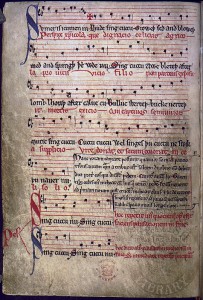Credit to the choir for this latest rehearsal: we worked through a lot of repertoire in a very short time.
Time to re-visit the Advent antiphons, and to capture some of that floating effortlessness that sounds so easy, but is hard to achieve; you can’t really conduct them too much lest you destroy the sense of freedom that they seem to occupy, so the choir have to trust one another to come in after the pauses and have confidence in the phrases; in other words, they have to know the music really well!
From a wind-swept and rainy late October, we moved through the seasons to the approach of summer with Sumer is icumen in, with its lusty dance-rhythms and its rustic celebration of the turning of the season to herald the beginning of summer. We’re working on a medieaval English style of pronunciation – ‘Sumer is icumen in, lhude sing cucu; growth sed and bloweth med and spring be wude nu.’ I firmly believe in performing ancient and modern music side by side, a terrific way of glimpsing the sounds of the past and sometimes showing that some modern music sounds as ancient as medieval manuscripts, whilst some ancient music can sound as modern as contemporary pieces. We’re working on creating a vibrant, lively sound – no ‘received pronunciation’ here! – to bring it to life. There are also sacred words to the song, ‘Perspice christicola,’ which we’ll perform later in the same February programme with a wholly different and more appropriate sensibility.
Thence to the last of the Vaughan Williams Shakespeare Songs, ‘Over hill, over dale,’ which in its 6/8 rhythm dances along over bush and briar; we worked at it slowly, and then sang it through at a rough mid-tempo pace – it’s nearly there, another rehearsal will have it dancing off the page. We also returned to the first half of ‘Full Fathom Five,’ and really worked to make the bell-peal imitations ‘ping’ off the page with a percussive start to each ‘ding.’ We also explored the rich chords clothing the word ‘strange,’ and immersed ourselves in the chords by prolonging them, to get used to the sound of the flattened sixths and added seconds and the way the notes beat against one another.
After the break, we entered the almost mystical landscape of Warlock’s Bethlehem Down, and it was here that the choir started to come together for the first time that evening. Something obviously clicked – several of the choir have sung the piece before, admittedly – but somehow the atmosphere created by the text and the harmonies Warlock spins around the words came straight off the page. We explored dynamic contrasts between verses, as well as between lines in the verses; the greatest challenge was to get rid of the bar-lines, and sustain the long phrases across the bars without breaking the line and losing the impetus.
A brief recap of the opening sections of the ‘Gloria’ from the Jackson Edinburgh Mass; difficult music, rhythmically challenging and harmonically, lots of cluster chords to get right.
We ended by singing Today The Virgin and A Babe is Born; lots of rhythmic drive needed for the Tavener, and a richer sound required, whilst A Babe is Born needs plenty of bounce and energy to help it dance along.
Some really good work here, particularly the Warlock: with all its meandering lines and harmonic twists, it came alive almost immediately and was a joy to work up. Next week ? Hopefully the carol books will have arrived, so we can prepare the more traditional carols for the Advent concert.

